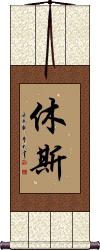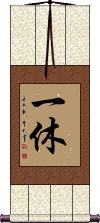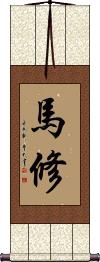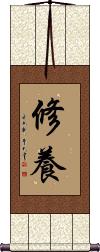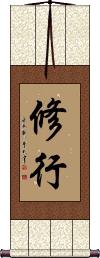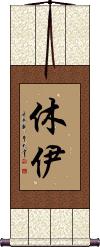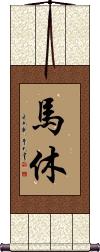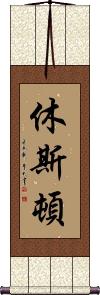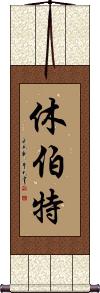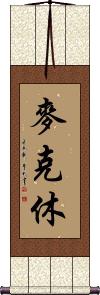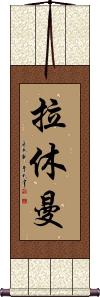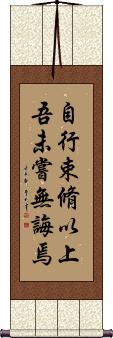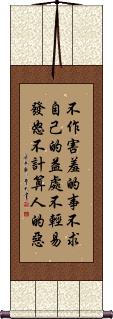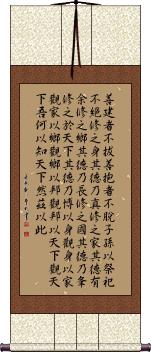Many custom options...
And formats...

Xiu1 in Chinese / Japanese...
Buy a Xiu1 calligraphy wall scroll here!
Personalize your custom “Xiu1” project by clicking the button next to your favorite “Xiu1” title below...
1. Hughes
2. Ikkyu
3. Mathieu
4. Matthew
6. Shugyo
7. Huey
8. Matheo
9. Mahieu
10. Cassius
12. Houston
13. Hubert
14. Matheus
15. Lucius
16. Kassius
17. Matthews
18. McHugh
19. Rahuman
20. Abbenhuis
21. Ignatius
Hughes
Ikkyu
Mathieu
Matthew
Self-Improvement
修養 means self-improvement in Chinese, Japanese Kanji, and old Korean Hanja.
Other translations for this word include accomplishment, training, self-cultivation, (mental) training, self-discipline, cultivation, or cultivating moral character.
Shugyo
修行 is shugyō or shugyou in Japanese. It refers to ascetic practices, training, practice, discipline, and study.
修行 is also a word in the original Chinese, referring more to religious studies and practices.
In the Buddhist context, this represents caryā. In Buddhism, this relates to one's conduct, observing and doing, cultivating oneself in the right practice, and/or being pious.
Huey
Matheo
Mahieu
Cassius
Frightful Demon / Asura
This demon title comes from the ancient Sanskrit word Asura.
阿修羅 is often used in Buddhism when describing various demons. Sometimes defined as “Fighting and battling a giant demon.”
In the context of Buddhism: This title originally meant a spirit, spirits, or even the gods (perhaps before 1700 years ago). It now generally indicates titanic demons, enemies of the gods, with whom, especially Indra, they wage constant war. They are defined as “not devas,” “ugly,” and “without wine.” There are four classes of asuras, separated according to their manner of rebirth. They can be egg-born, womb-born, transformation-born, and spawn- or water-born. Their abode is in the ocean, north of Sumeru but certain of the weaker dwell in a western mountain cave. They have realms, rulers, and palaces, as have the devas.
In terms of power, Asuras rank above humans but below most other deities. They live near the coastal foot of Mount Sumeru (on the northern side). Their domain is partially or wholly in the ocean.
Houston
Hubert
Matheus
Lucius
Kassius
Matthews
McHugh
Rahuman
Abbenhuis
Ignatius
Confucius: Universal Education
自行束脩以上吾未尝无诲焉 means, for anyone who brings even the smallest token of appreciation, I have yet to refuse instruction.
Another way to put it is: If a student (or potential student) shows just an ounce of interest, desire, or appreciation for the opportunity to learn, a teacher should offer a pound of knowledge.
This quote is from the Analects of Confucius.
This was written over 2500 years ago. The composition is in ancient Chinese grammar and phrasing. A modern Chinese person would need a background in Chinese literature to understand this without the aid of a reference.
1 Corinthians 13:5
Here is 1 Corinthians 13:5 in Chinese.
The text with punctuation:
不作害羞的事。不求自己的益处。不轻易发怒。不计算人的恶。
Hand-painted calligraphy does not retain punctuation.
This translation is from the Chinese Union Bible.
You may know it from the KJV as:
Doth not behave itself unseemly, seeketh not her own, is not easily provoked, thinketh no evil.
Daodejing / Tao Te Ching - Chapter 54
This is the Mawangdui version of Daodejing chapter 54.
By its virtue alone can one generation after another carry on the ancestral sacrifice.
Apply it to yourself, and by its power, you will be freed from dross.
Apply it to your household, and your household shall thereby have abundance.
Apply it to the village, and the village will be made secure.
Apply it to the kingdom, and the kingdom shall thereby be made to flourish.
Apply it to an empire, and the empire shall thereby be extended.
Therefore just as through oneself, one may contemplate Oneself;
So through the household one may contemplate the Household;
And through the village, one may contemplate the Village;
And through the kingdom, one may contemplate the Kingdom;
And through the empire, one may contemplate the Empire.
How do I know that the empire is so? By this.
What is firmly rooted cannot be pulled out;
What is tightly held in the arms will not slip loose;
Through this, the offering of sacrifice by descendants will never come to an end.
Cultivate it in your person, and its virtue will be genuine;
Cultivate it in the family, and its virtue will be more than sufficient;
Cultivate it in the hamlet, and its virtue will endure;
Cultivate it in the state, and its virtue will abound;
Cultivate it in the empire, and its virtue will be pervasive.
Hence look at the person through the person;
Look at the family through the family;
Look at the hamlet through the hamlet;
Look at the state through the state;
Look at the empire through the empire.
How do I know that the empire is like that?
By means of this.
Not the results for xiu1 that you were looking for?
Below are some entries from our dictionary that may match your xiu1 search...
| Characters If shown, 2nd row is Simp. Chinese |
Pronunciation Romanization |
Simple Dictionary Definition |
一休 see styles |
yī xiū yi1 xiu1 i hsiu ikkyuu / ikkyu いっきゅう |
More info & calligraphy: IkkyuIkkyū |
修行 see styles |
xiū xíng xiu1 xing2 hsiu hsing shugyou(p); sugyou(ok) / shugyo(p); sugyo(ok) しゅぎょう(P); すぎょう(ok) |
More info & calligraphy: Shugyo(noun, transitive verb) (1) training; practice; discipline; study; (noun, transitive verb) (2) {Buddh} ascetic practices; (personal name) Nobuyuki caryā, conduct; to observe and do; to end one's ways; to cultivate oneself in right practice; be religious, or pious. |
修養 修养 see styles |
xiū yǎng xiu1 yang3 hsiu yang shuuyou / shuyo しゅうよう |
More info & calligraphy: Self-Improvement(n,vs,vi) self-improvement; (mental) training; self-discipline; cultivation cultivating moral character |
休斯頓 休斯顿 see styles |
xiū sī dùn xiu1 si1 dun4 hsiu ssu tun |
More info & calligraphy: Houston |
阿修羅 阿修罗 see styles |
ā xiū luó a1 xiu1 luo2 a hsiu lo ashura; asura あしゅら; あすら |
More info & calligraphy: Frightful Demon / Asura{Buddh} Asura; demigod; anti-god; titan; demigods that fight the Devas (gods) in Hindu mythology; (female given name) Ashura asura, 修羅 originally meaning a spirit, spirits, or even the gods, it generally indicates titanic demons, enemies of the gods, with whom, especially Indra, they wage constant war. They are defined as 'not devas', and 'ugly', and 'without wine'. Other forms are 阿須羅 (or 阿蘇羅, or 阿素羅); 阿修倫 (or羅須倫 or 阿修輪 or 羅須輪); 阿素洛; 阿差. Four classes are named according to their manner of rebirth-egg, born, womb-born, transformation-born, and spawn- or water-born. Their abode is in the ocean, north of Sumeru, but certain of the weaker dwell in a western mountain cave. They have realms, rulers, and palaces, as have the devas. The 阿修羅道 is one of the six gatis, or ways of reincarnation. The 修羅場 or 修羅巷 is the battlefield of the asuras against Indra. The 阿修羅琴 are their harps. |
休 see styles |
xiū xiu1 hsiu yasumu やすむ |
to rest; to stop doing something for a period of time; to cease; (imperative) don't (personal name) Yasumu Desist, give up; resign; divorce; blessing, favour. |
修 see styles |
xiū xiu1 hsiu yoshimi よしみ |
to decorate; to embellish; to repair; to build; to write; to cultivate; to study; to take (a class) (given name) Yoshimi To put in order, mend, cultivate, observe. Translit. su, sū. Cf. 須; 蘇. |
咻 see styles |
xiū xiu1 hsiu |
call out; jeer |
庥 see styles |
xiū xiu1 hsiu |
protection; shade |
羞 see styles |
xiū xiu1 hsiu |
shy; ashamed; shame; bashful; variant of 饈|馐[xiu1]; delicacies |
脩 修 see styles |
xiū xiu1 hsiu hisashi ひさし |
dried meat presented by pupils to their teacher at their first meeting (in ancient times); dried; withered (personal name) Hisashi to handle |
茠 see styles |
xiū xiu1 hsiu |
to weed; to eradicate |
貅 see styles |
xiū xiu1 hsiu |
see 貔貅[pi2 xiu1], composite mythical animal (originally 貅 was the female) |
饈 馐 see styles |
xiū xiu1 hsiu |
delicacies |
髹 see styles |
xiū xiu1 hsiu |
red lacquer; to lacquer |
鵂 鸺 see styles |
xiū xiu1 hsiu ku |
owl ulūka, an owl. |
三修 see styles |
sān xiū san1 xiu1 san hsiu san shū |
The three ways of discipline, i.e. three śrāvaka and three bodhisattva ways. The three śrāvaka ways are 無常修 no realization of the eternal, seeing everything as transient; 非樂修 joyless, through only contemplating misery and not realizing the ultimate nirvāṇa-joy; 無我修 non-ego discipline, seeing only the perishing self and not realizing the immortal self. The bodhisattva three are the opposite of these. |
下修 see styles |
xià xiū xia4 xiu1 hsia hsiu |
to revise downward |
不休 see styles |
bù xiū bu4 xiu1 pu hsiu fukyuu / fukyu ふきゅう |
endlessly; ceaselessly (noun - becomes adjective with の) (See 不眠不休) no rest; working nonstop |
不修 see styles |
bù xiū bu4 xiu1 pu hsiu fushu |
not practicing |
且休 see styles |
qiě xiū qie3 xiu1 ch`ieh hsiu chieh hsiu |
rest for now; stop (usually imperative form) |
主修 see styles |
zhǔ xiū zhu3 xiu1 chu hsiu |
(education) to major in; major |
乞休 see styles |
qǐ xiū qi3 xiu1 ch`i hsiu chi hsiu |
to request permission to resign from an official position (old) |
二修 see styles |
èr xiū er4 xiu1 erh hsiu niś hu |
Two kinds of devotion or practice, 專修 and 雜修 sole or single-minded, and miscellaneous or varied, defined as (1) chief or sole duty, and (2) aids thereto or adjunctive observances. Also 緣修 causative devotion of a bodhisattva in former life, and 眞修 its actual manifestation here. |
介休 see styles |
jiè xiū jie4 xiu1 chieh hsiu |
Jiexiu, county-level city in Jinzhong 晉中|晋中[Jin4 zhong1], Shanxi |
令修 see styles |
lìng xiū ling4 xiu1 ling hsiu ryōshu |
to make (someone) practice |
休假 see styles |
xiū jià xiu1 jia4 hsiu chia |
to go on vacation; to have a holiday; to take leave |
休克 see styles |
xiū kè xiu1 ke4 hsiu k`o hsiu ko |
shock (loanword); to go into shock |
休兵 see styles |
xiū bīng xiu1 bing1 hsiu ping |
to cease fire; armistice; rested troops |
休妻 see styles |
xiū qī xiu1 qi1 hsiu ch`i hsiu chi |
to repudiate one's wife |
Click here for more xiu1 results from our dictionary
The following table may be helpful for those studying Chinese or Japanese...
| Title | Characters | Romaji (Romanized Japanese) | Various forms of Romanized Chinese | |
| Hughes | 休斯 | xiū sī / xiu1 si1 / xiu si / xiusi | hsiu ssu / hsiussu | |
| Ikkyu | 一休 | Ikkyū / Ikyū | yī xiū / yi1 xiu1 / yi xiu / yixiu | i hsiu / ihsiu |
| Mathieu | 馬修 马修 | mǎ xiū / ma3 xiu1 / ma xiu / maxiu | ma hsiu / mahsiu | |
| Matthew | 馬修 马修 | mǎ xiū / ma3 xiu1 / ma xiu / maxiu | ma hsiu / mahsiu | |
| Self-Improvement | 修養 修养 | shuuyou / shuyo shuyo / shuyo | xiū yǎng / xiu1 yang3 / xiu yang / xiuyang | hsiu yang / hsiuyang |
| Shugyo | 修行 | shu gyou / shugyou / shu gyo | xiū xíng / xiu1 xing2 / xiu xing / xiuxing | hsiu hsing / hsiuhsing |
| Huey | 休伊 | xiū yī / xiu1 yi1 / xiu yi / xiuyi | hsiu i / hsiui | |
| Matheo | 馬修 马修 | mǎ xiū / ma3 xiu1 / ma xiu / maxiu | ma hsiu / mahsiu | |
| Mahieu | 馬休 马休 | mǎ xiū / ma3 xiu1 / ma xiu / maxiu | ma hsiu / mahsiu | |
| Cassius | 卡修斯 | kǎ xiū sī ka3 xiu1 si1 ka xiu si kaxiusi | k`a hsiu ssu kahsiussu ka hsiu ssu |
|
| Frightful Demon Asura | 阿修羅 阿修罗 | ashura | ē xiū luó e1 xiu1 luo2 e xiu luo exiuluo | o hsiu lo ohsiulo |
| Houston | 休斯頓 休斯顿 | xiū sī dùn xiu1 si1 dun4 xiu si dun xiusidun | hsiu ssu tun hsiussutun |
|
| Hubert | 休伯特 | xiū bó tè xiu1 bo2 te4 xiu bo te xiubote | hsiu po t`e hsiupote hsiu po te |
|
| Matheus | 馬修斯 马修斯 | mǎ xiū sī ma3 xiu1 si1 ma xiu si maxiusi | ma hsiu ssu mahsiussu |
|
| Lucius | 盧修斯 卢修斯 | lú xiū sī lu2 xiu1 si1 lu xiu si luxiusi | lu hsiu ssu luhsiussu |
|
| Kassius | 卡修斯 | kǎ xiū sī ka3 xiu1 si1 ka xiu si kaxiusi | k`a hsiu ssu kahsiussu ka hsiu ssu |
|
| Matthews | 馬修斯 马修斯 | mǎ xiū sī ma3 xiu1 si1 ma xiu si maxiusi | ma hsiu ssu mahsiussu |
|
| McHugh | 麥克休 麦克休 | mài kè xiū mai4 ke4 xiu1 mai ke xiu maikexiu | mai k`o hsiu maikohsiu mai ko hsiu |
|
| Rahuman | 拉休曼 | lā xiū màn la1 xiu1 man4 la xiu man laxiuman | la hsiu man lahsiuman |
|
| Abbenhuis | 阿本休斯 | ā běn xiū sī a1 ben3 xiu1 si1 a ben xiu si abenxiusi | a pen hsiu ssu apenhsiussu |
|
| Ignatius | 伊格內修斯 伊格内修斯 | yī gé nèi xiū sī yi1 ge2 nei4 xiu1 si1 yi ge nei xiu si yigeneixiusi | i ko nei hsiu ssu ikoneihsiussu |
|
| Confucius: Universal Education | 自行束脩以上吾未嘗無誨焉 (note 嘗 = 嚐) 自行束脩以上吾未尝无诲焉 | zì xíng shù xiū yǐ shàng wú wèi cháng wú huì yān zi4 xing2 shu4 xiu1 yi3 shang4 wu2 wei4 chang2 wu2 hui4 yan1 zi xing shu xiu yi shang wu wei chang wu hui yan | tzu hsing shu hsiu i shang wu wei ch`ang wu hui yen tzu hsing shu hsiu i shang wu wei chang wu hui yen |
|
| 1 Corinthians 13:5 | 不作害羞的事不求自己的益處不輕易發怒不計算人的惡 不作害羞的事不求自己的益处不轻易发怒不计算人的恶 | bù zuò hài xiū de shì bù qiú zì jǐ de yì chu bù qīng yì fā nù bù jì suàn rén de è bu4 zuo4 hai4 xiu1 de shi4 bu4 qiu2 zi4 ji3 de yi4 chu bu4 qing1 yi4 fa1 nu4 bu4 ji4 suan4 ren2 de e4 bu zuo hai xiu de shi bu qiu zi ji de yi chu bu qing yi fa nu bu ji suan ren de e | pu tso hai hsiu te shih pu ch`iu tzu chi te i ch`u pu ch`ing i fa nu pu chi suan jen te o pu tso hai hsiu te shih pu chiu tzu chi te i chu pu ching i fa nu pu chi suan jen te o |
|
| Daodejing Tao Te Ching - Chapter 54 | 善建者不拔善抱者不脫子孫以祭祀不絕修之身其德乃真修之家其德有余修之鄉其德乃長修之國其德乃夆修之於天下其德乃博以身觀身以家觀家以鄉觀鄉以邦觀邦以天下觀天下吾何以知天下然茲以此 善建者不拔善抱者不脱子孙以祭祀不绝修之身其德乃真修之家其德有余修之乡其德乃长修之国其德乃夆修之于天下其德乃博以身观身以家观家以乡观乡以邦观邦以天下观天下吾何以知天下然兹以此 | shàn jiàn zhě bù bá shàn bào zhě bù tuō zǐ sūn yǐ jì sì bù jué xiū zhī shēn qí dé nǎi zhēn xiū zhī jiā qí dé yǒu yú xiū zhī xiāng qí dé nǎi zhǎng xiū zhī guó qí dé nǎi féng xiū zhī yú tiān xià qí dé nǎi bó yǐ shēn guān shēn yǐ jiā guān jiā yǐ xiāng guān xiāng yǐ bāng guān bāng yǐ tiān xià guān tiān xià wú hé yǐ zhī tiān xià rán zī yǐ cǐ shan4 jian4 zhe3 bu4 ba2 shan4 bao4 zhe3 bu4 tuo1 zi3 sun1 yi3 ji4 si4 bu4 jue2 xiu1 zhi1 shen1 qi2 de2 nai3 zhen1 xiu1 zhi1 jia1 qi2 de2 you3 yu2 xiu1 zhi1 xiang1 qi2 de2 nai3 zhang3 xiu1 zhi1 guo2 qi2 de2 nai3 feng2 xiu1 zhi1 yu2 tian1 xia4 qi2 de2 nai3 bo2 yi3 shen1 guan1 shen1 yi3 jia1 guan1 jia1 yi3 xiang1 guan1 xiang1 yi3 bang1 guan1 bang1 yi3 tian1 xia4 guan1 tian1 xia4 wu2 he2 yi3 zhi1 tian1 xia4 ran2 zi1 yi3 ci3 shan jian zhe bu ba shan bao zhe bu tuo zi sun yi ji si bu jue xiu zhi shen qi de nai zhen xiu zhi jia qi de you yu xiu zhi xiang qi de nai zhang xiu zhi guo qi de nai feng xiu zhi yu tian xia qi de nai bo yi shen guan shen yi jia guan jia yi xiang guan xiang yi bang guan bang yi tian xia guan tian xia wu he yi zhi tian xia ran zi yi ci | shan chien che pu pa shan pao che pu t`o tzu sun i chi ssu pu chüeh hsiu chih shen ch`i te nai chen hsiu chih chia ch`i te yu yü hsiu chih hsiang ch`i te nai chang hsiu chih kuo ch`i te nai feng hsiu chih yü t`ien hsia ch`i te nai po i shen kuan shen i chia kuan chia i hsiang kuan hsiang i pang kuan pang i t`ien hsia kuan t`ien hsia wu ho i chih t`ien hsia jan tzu i tz`u shan chien che pu pa shan pao che pu to tzu sun i chi ssu pu chüeh hsiu chih shen chi te nai chen hsiu chih chia chi te yu yü hsiu chih hsiang chi te nai chang hsiu chih kuo chi te nai feng hsiu chih yü tien hsia chi te nai po i shen kuan shen i chia kuan chia i hsiang kuan hsiang i pang kuan pang i tien hsia kuan tien hsia wu ho i chih tien hsia jan tzu i tzu |
|
| In some entries above you will see that characters have different versions above and below a line. In these cases, the characters above the line are Traditional Chinese, while the ones below are Simplified Chinese. | ||||
Successful Chinese Character and Japanese Kanji calligraphy searches within the last few hours...
